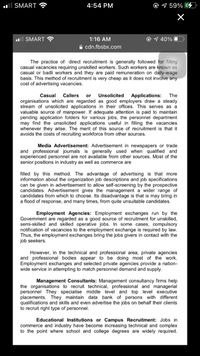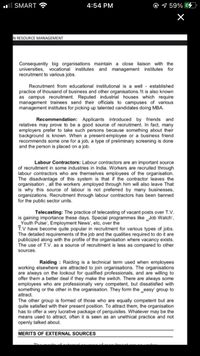
Understanding Business
12th Edition
ISBN: 9781259929434
Author: William Nickels
Publisher: McGraw-Hill Education
expand_more
expand_more
format_list_bulleted
Question
3. Which external sources of recruitment are commonly used by the big enterprises that you believe are more effective and less effective to acquire new talent/employee. Explain your answer.
(the following external sources of recruiting that are commonly used by the big enterprise are listed in the picture)

Transcribed Image Text:ll SMART
4:54 PM
9 59%
ll SMART ?
1:16 AM
O 7 40% O
A cdn.fbsbx.com
The practice of: direct recruitment is generally followed for filling
casual vacancies requiring unskilled workers. Such workers are known as
casual or badli workers and they are paid remuneration on daily-wage
basis. This method of recruitment is very cheap as it does not involve any
cost of advertising vacancies.
Casual
Callers
Unsolicited
Applications:
The
or
organisations which are regarded as good employers draw a steady
stream of unsolicited applications in their offices. This serves as a
valuable source of manpower. If adequate attention is paid to maintain
pending application folders for various jobs, the personnel department
may find the unsolicited applications useful in filling the vacancies
whenever they arise. The merit of this source of recruitment is that it
avoids the costs of recruiting workforce from other sources.
Media Advertisement: Advertisement in newspapers or trade
and professional journals is generally used when qualified and
experienced personnel are not available from other sources. Most of the
senior positions in industry as well as commerce are
filled by this method. The advantage of advertising is that more
information about the organization job descriptions and job specifications
can be given in advertisement to allow self-screening by the prospective
candidates. Advertisement gives the management a wider range of
candidates from which to choose. Its disadvantage is that is may bring in
a flood of response, and many times, from quite unsuitable candidates.
Employment Agencies: Employment exchanges run by the
Govemment are regarded as a good source of recruitment for unskilled,
semi-skilled and skilled operative jobs. In some cases, compulsory
notification of vacancies to the employment exchange is required by law.
Thus, the employment exchanges bring the jobs givers in contact with the
job seekers.
However, in the technical and professional area, private agencies
and professional bodies appear to be doing most of the work.
Employment exchanges and selected private agencies provide a nation-
wide service in attempting to match personnel demand and supply.
Management Consultants: Management consultancy firms help
the organisations to recruit technical, professional and managerial
personnel They specialise middle level and top level executive
placements. They maintain data bank of persons with different
qualifications and skills and even advertise the jobs on behalf their clients
to recruit right type of personnel.
Educational Institutions or Campus Recruitment: Jobs in
commerce and industry have become increasing technical and complex
to the point where school and college degrees are widely required.

Transcribed Image Text:ll SMART
4:54 PM
9 59% 4
N RESOURCE MANAGEMENT
Consequently big organisations maintain a close liaison with the
universities, vocational institutes and management institutes for
recruitment to various jobs.
Recruitment from educational institutional is a well - established
practice of thousand of business and other organisations.1t is also known
as campus recruitment. Reputed industrial houses which require
management trainees send their officials to campuses of various
management institutes for picking up talented candidates doing MBA.
Recommendation: Applicants introduced by friends and
relatives may prove to be a good source of recruitment. In fact, many
employers prefer to take such persons because something about their
background is known. When a present-employee or
recommends some one for a job, a type of preliminary screening is done
and the person is placed on a job.
business friend
Labour Contractors: Labour contractors are an important source
of recruitment in some industries in India. Workers are recruited through
labour contractors who are themselves employees of the organisation.
The disadvantage of this system is that if the contractor leaves the
organisation , all the workers ,employed through him will also leave That
is why this source of labour is not preferred by many businesses,
organizations. Recruitment through labour contractors has been banned
for the public sector units.
Telecasting: The practice of telecasting of vacant posts over T.V.
is gaining importance these days. Special programmes like _Job Watch',
Youth Pulse', Employment News', etc, over the
T.V have become quite popular in recruitment for various types of jobs.
The detailed requirements of the job and the qualities required to do it are
publicized along with the profile of the organisation where vacancy exists.
The use of T.V. as a source of recruitment is less as compared to other
sources.
Raiding : Raiding is a technical term used when employees
working elsewhere are attracted to join organisations. The organisations
are always on the lookout for qualified professionals, and are willing to
offer them a better deal if they make the switch. There are always some
employees who are professionally very competent, but dissatisfied with
something or the other in the organisation. They form the _easy' group to
attract.
The other group is formed of those who are equally competent but are
quite satisfied with their present position. To attract them, the organisation
has to offer a very lucrative package of perquisites. Whatever may be the
means used to attract, often it is seen as an unethical practice and not
openly talked about.
MERITS OF EXTERNAL SOURCES
Expert Solution
This question has been solved!
Explore an expertly crafted, step-by-step solution for a thorough understanding of key concepts.
This is a popular solution
Trending nowThis is a popular solution!
Step by stepSolved in 2 steps

Knowledge Booster
Similar questions
- What are examples of the recruitment Policy, and what specific information about your employee policy regarding Prohibited interview questions, Procedures for new employees, Orientation, Tax forms, Employment eligibility verification, Offer of employment, Background screening requirements, and Controlled substances and alcohol policy for drivers of company vehicles?arrow_forwardIt is proven that organisations need to have different employment strategies depending on the needs of the role. Based on this explain where internal recruitment may be most appropriate and also, where external recruitment will be most suitable. Also, discuss the pros and cons of the two recruitment methods.arrow_forwardI need the answer as soon as possiblearrow_forward
arrow_back_ios
arrow_forward_ios
Recommended textbooks for you
 Understanding BusinessManagementISBN:9781259929434Author:William NickelsPublisher:McGraw-Hill Education
Understanding BusinessManagementISBN:9781259929434Author:William NickelsPublisher:McGraw-Hill Education Management (14th Edition)ManagementISBN:9780134527604Author:Stephen P. Robbins, Mary A. CoulterPublisher:PEARSON
Management (14th Edition)ManagementISBN:9780134527604Author:Stephen P. Robbins, Mary A. CoulterPublisher:PEARSON Spreadsheet Modeling & Decision Analysis: A Pract...ManagementISBN:9781305947412Author:Cliff RagsdalePublisher:Cengage Learning
Spreadsheet Modeling & Decision Analysis: A Pract...ManagementISBN:9781305947412Author:Cliff RagsdalePublisher:Cengage Learning Management Information Systems: Managing The Digi...ManagementISBN:9780135191798Author:Kenneth C. Laudon, Jane P. LaudonPublisher:PEARSON
Management Information Systems: Managing The Digi...ManagementISBN:9780135191798Author:Kenneth C. Laudon, Jane P. LaudonPublisher:PEARSON Business Essentials (12th Edition) (What's New in...ManagementISBN:9780134728391Author:Ronald J. Ebert, Ricky W. GriffinPublisher:PEARSON
Business Essentials (12th Edition) (What's New in...ManagementISBN:9780134728391Author:Ronald J. Ebert, Ricky W. GriffinPublisher:PEARSON Fundamentals of Management (10th Edition)ManagementISBN:9780134237473Author:Stephen P. Robbins, Mary A. Coulter, David A. De CenzoPublisher:PEARSON
Fundamentals of Management (10th Edition)ManagementISBN:9780134237473Author:Stephen P. Robbins, Mary A. Coulter, David A. De CenzoPublisher:PEARSON

Understanding Business
Management
ISBN:9781259929434
Author:William Nickels
Publisher:McGraw-Hill Education

Management (14th Edition)
Management
ISBN:9780134527604
Author:Stephen P. Robbins, Mary A. Coulter
Publisher:PEARSON

Spreadsheet Modeling & Decision Analysis: A Pract...
Management
ISBN:9781305947412
Author:Cliff Ragsdale
Publisher:Cengage Learning

Management Information Systems: Managing The Digi...
Management
ISBN:9780135191798
Author:Kenneth C. Laudon, Jane P. Laudon
Publisher:PEARSON

Business Essentials (12th Edition) (What's New in...
Management
ISBN:9780134728391
Author:Ronald J. Ebert, Ricky W. Griffin
Publisher:PEARSON

Fundamentals of Management (10th Edition)
Management
ISBN:9780134237473
Author:Stephen P. Robbins, Mary A. Coulter, David A. De Cenzo
Publisher:PEARSON